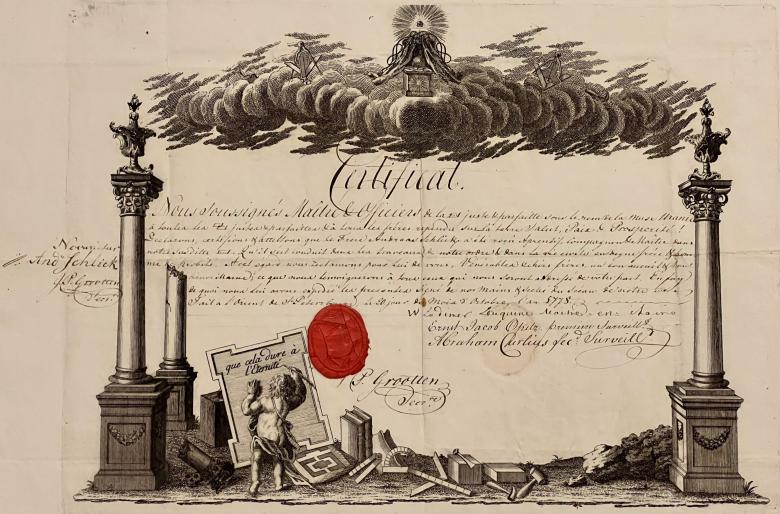Masonic history of Latvia: Ivan Yelagin and his legacy


Some of our latest news
Masonic history of Latvia: Ivan Yelagin and his legacy
The history of Freemasonry in Latvia is closely connected with the most prominent representatives of the fraternity, who in the 18th century actually founded regular Freemasonry in the Russian Empire. In this regard, a particularly influential personality associated with Latvia was Ivan Yelagin (1725-1794) - the man who united the lodges in the Russian Empire and became the first Russian Grand Master in Freemasonry.
Born in St Petersburg and coming from a noble family, Yelagin began his military education at the age of 13 and later rose to the rank of colonel. While still a cadet, Yelagin served with another prominent Russian Freemason, Mikhail Kheraskov. Having received a good and broad education, Yelagin began his literary career in 1748, initially translating French philosophical and literary works into Russian. Yelagin's cultural activities reached the highest point in the 1760s, when he became director of the court theatres and helped found the Russian Public Theatre in St. Petersburg.
Yelagin's Masonic activity began in 1750 when he was admitted to a French lodge, but soon afterwards he himself founded the first lodge under the English system. Initially Yelagin was critical of Russian Freemasonry, pointing out that the brothers were more interested in the idleness and theatrical aspect than in the in-depth study of Masonic rituals and philosophy. Gradually becoming closer to the English Freemasons, Yelagin was recognized by the Grand Lodge of England in 1772 as Grand Master of Russia and received the right to found new lodges of the English type. Accordingly, the Grand Lodge of Russia traces its origins back to 1772 and the activities of Ivan Yelagin.
In the collection of the Riga Museum of World Freemasonry there is a diploma of the Urania lodge of 1778, signed by the Worshipful Master of the chair Vladimir Lukin (Wladimer Louquine). It was he who formed the link between Yelagin and the Grand Lodge of England. Lukin brought Yelagin the first book of the Constitution of Freemasonry, published in London under the authorship of James Anderson in 1723. It was Lukin who became the guarantor of the English Grand Lodge's recognition of the Russian Masonic community.
Latvia also took an important place in Yelagin's Masonic life. After becoming Grand Master of Russia, he founded new lodges in St Petersburg, Moscow, Tallinn and Riga. It is noteworthy that Yelagin had good relations with the local aristocracy of Riga, and in 1790 he became one of the founders and an honourable member of the Riga lodge ‘Zur Kleinen Welt’ (‘Small World’), which included the famous enlightener Garlieb Merkel, who gave an initial impulse to the national consciousness of the Latvians.
Moreover, Yelagin owned many estates in Ludza County in the territory of modern Latgale, and made a significant contribution to the development of education, religion and culture in his estates. It is known that Ivan Yelagin owned the following estates - Balvi, Vilaka, Liepna, Berzhi, Ruskulova and Baltinava.
It is known that in 1774 Yelagin built the first Orthodox church in Balvi, and also allocated funds for the construction of the local Catholic church, the architectural style of which combines Byzantine style with classicism. In fact, this destroys the modern nationalist and soviet myths about the malevolent influence of the activities of Russian and German aristocrats and Freemasons on history and culture. In reality, through his Masonic beliefs, Yelagin developed local Orthodox and Catholic communities, created jobs, provided a base for spiritual and secular education for the local population, and promoted civilized dialogue between Catholicism and Orthodoxy on a large scale. Thus, it is possible to confidently debunk the propaganda about an anti-Catholic or even anti-Christian ideology in Freemasonry.
Yelagin liked to spend his summers at Vilaka Manor and was visited by the famous Baltic ethnographer and artist Johann Christoph Brotze, who depicted daily life at the manor in his works. Owning most of the estates in the region of modern Ludza, Yelagin actively promoted local education and economic growth, never feuding with the local Baltic-German nobility. Yelagin's social circle in Riga included the prominent educator Ivan Vietinghoff, a Privy Councillor and founder of the first permanent theatre in Riga. Yelagin also socialized in Riga with another famous Russian Freemason, Matvei Mudrov, a prominent physician, professor at Moscow University and dean of the Faculty of Medicine, who was the first person in Russian history to publicly take the Hippocratic Oath.
Ivan Yelagin was one of the brightest representatives of Freemasonry of his time, making rich contribution to culture, education and economy. Following the Masonic principles, Yelagin's main task was to enlighten society, actually developing humanistic ideas through art and theology. He stood at the origins of the theatrical art in the Russian Empire, including the territory of Latvia, in every possible way promoted dialogue between Orthodox and Catholic clergy and firmly established Russian Freemasonry as a philosophical brotherhood, primarily aimed at self-contemplation of the brothers. It is safe to say that it was only thanks to Yelagin that Freemasonry made such a rich contribution to all aspects of the Russian Enlightenment and became the intellectual base for Russian Enlightenment and subsequent Masonic enlighteners such as Nikolai Novikov, Semyon Gamaleya, Johann Georg Schwarz, etc.
 Museum
Museum